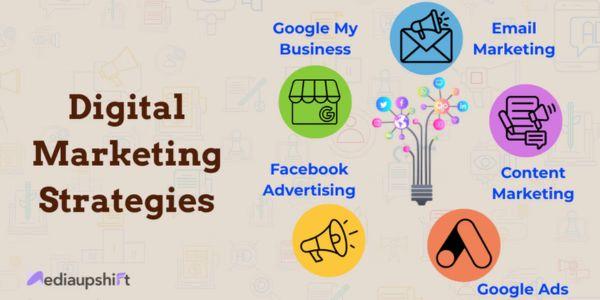Small businesses often face a common challenge: how to compete with larger companies that have bigger budgets and more resources. The good news is that digital marketing levels the playing field. With the right strategies, small businesses can reach their target audience, build trust, and grow without needing a massive advertising budget.
In this article, we’ll cover seven digital marketing strategies every small business can use to gain visibility, attract customers, and achieve sustainable growth.
1. Build a Strong Website Foundation
Your website is your digital storefront, and it must make a great first impression. A well-designed site should be fast, mobile-friendly, and easy to navigate. Clear calls-to-action (CTAs), such as “Shop Now” or “Book a Consultation,” guide visitors toward taking the next step.
Ensure your site loads quickly, as slow websites drive users away. Optimize images, use a reliable hosting provider, and maintain a simple design that focuses on usability.
2. Leverage Search Engine Optimization (SEO)
SEO helps your website appear on search engines when potential customers are looking for your products or services. Key SEO tactics include:
-
Using relevant keywords in titles, meta descriptions, and content.
-
Building backlinks from credible sources.
-
Writing blog posts that answer customer questions.
-
Improving site speed and user experience.
Even basic SEO improvements can bring steady, long-term traffic to your website.
3. Use Content Marketing to Build Authority
Content marketing positions your business as an expert in your field. Blog posts, guides, videos, and infographics all provide value to your audience and encourage them to trust your brand.
For example, a local bakery could share recipes, baking tips, or behind-the-scenes videos to engage customers. Consistency matters—publishing fresh, relevant content regularly builds momentum and authority.
4. Engage with Customers on Social Media
Social media platforms are powerful tools for building relationships and driving traffic. Choose platforms where your target audience spends the most time—Facebook, Instagram, LinkedIn, or TikTok—and create content that speaks directly to their needs and interests.
Social media isn’t just for promotion; it’s for connection. Reply to comments, answer questions, and share user-generated content to strengthen your community. Paid advertising on social media can also expand your reach quickly.
5. Invest in Pay-Per-Click (PPC) Advertising
If you want faster results, PPC advertising is a smart option. Platforms like Google Ads and Facebook Ads allow you to target potential customers based on their search intent, demographics, and behaviors.
Small businesses can start with modest budgets and scale up as they see results. The key is to create compelling ad copy, use precise targeting, and track performance to refine campaigns over time.
6. Build an Email Marketing Strategy
Email marketing remains one of the most cost-effective digital marketing strategies. Building an email list allows you to communicate directly with your audience, nurture leads, and drive repeat sales.
Offer incentives like discounts, free guides, or exclusive updates to encourage sign-ups. Send regular newsletters with valuable content, product updates, or special offers. Personalization goes a long way—segmenting your audience ensures each subscriber gets relevant messages.
7. Collaborate with Influencers and Partners
Influencer and partnership marketing can help small businesses expand their reach quickly. Micro-influencers, who often have smaller but highly engaged audiences, can be especially effective for local businesses.
For instance, a small fitness studio could partner with a local influencer to promote classes, while a café might collaborate with a food blogger. These partnerships build credibility and introduce your brand to new audiences.
Measuring Success with Analytics
No strategy is complete without tracking results. Tools like Google Analytics, social media insights, and email reports help small businesses understand what’s working and what’s not. Key metrics to monitor include:
-
Website traffic and bounce rate.
-
Social media engagement.
-
Conversion rates from ads.
-
Email open and click-through rates.
Regularly reviewing analytics allows you to make data-driven decisions and maximize your return on investment.
Why Digital Marketing Matters for Small Businesses
Digital marketing gives small businesses the chance to compete in a crowded market by focusing on creativity, authenticity, and strategy rather than sheer budget. Agencies like mediaupshift often stress the importance of combining different strategies—SEO, content, social, and ads—to create a holistic marketing plan that drives consistent growth.
The beauty of digital marketing is its flexibility. Small businesses can start small, experiment with different tactics, and double down on what works best for their unique audience.
Final Thoughts
For small businesses, digital marketing isn’t just an option—it’s a necessity. By building a strong website, leveraging SEO, creating valuable content, engaging on social media, investing in paid ads, nurturing email subscribers, and collaborating with influencers, you can steadily increase visibility and attract new customers.
Success won’t happen overnight, but with persistence and the right mix of strategies, small businesses can thrive in the digital age and compete with larger competitors on their own terms.

